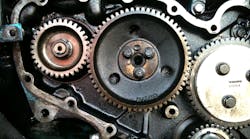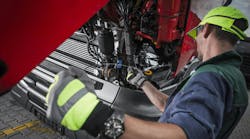If you’re a fleet manager, your equipment’s performance is directly connected to the success of your business.
Many of the fleet customers we talk with understand the importance of proper, routine equipment maintenance. In fact, many of them know their equipment’s OEM-recommended engine oil change intervals or have them within an arm’s reach at the shop.
That might also be true for your operation. Now think fast: do you know your recommended gear oil schedule for your equipment? “Hmm… that one might take a bit longer to find,” is typically the response we hear when we ask that question.
Just because gear oil isn’t always top of mind doesn’t mean it shouldn’t be at the top of your equipment maintenance priority list. For those not as familiar with gear lubricants, here is a brief guide to proper gear oil maintenance.
What gear oil protects: Gear oil is designed to protect vital components, including the gears and bearings in the drive axles and differentials, transmissions, industrial gear boxes and power take-off units. Gear oil generally has a higher viscosity for easier distribution and protection through the entire gear set.
Choosing the right gear oil: Always use the OEM-specified product or a product of equal quality. It can be tempting to cut costs by using an off-brand or lower-quality product. However, because the change interval is longer, it’s even more important to use a quality lubricant to ensure top equipment performance. Premium gear oils include anti-wear additives to increase durability, as well as dispersants to reduce sludge and carbon varnish buildup.
Signs of poor gear oil maintenance: Much like traditional engine oil, gear oil that has been used for too long will be dark from oxidation and debris. Depending on how long it’s been since the last change, the gear oil can also have an increased, thick viscosity. If not changed regularly, the gear oil will break down, allowing friction and grinding of gear components, resulting in unnecessary wear and costly repairs.
Gear oil maintenance schedule: Always refer to your OEM equipment manual for the recommended change interval for each piece of equipment.
Evaluating your engine lubricants: Longer change intervals can make it easy to keep gears out of sight and out of mind. Combat this tendency by performing an oil analysis on each piece of equipment at least once a year. An oil analysis is like a blood test for your equipment. It will provide a detailed report highlighting exactly how your lubricants are performing and identify any potential mechanical issues before they become serious problems.
—Andrew Hamilton is technical services and quality manager for Cenex brand lubricants. With more than 25 years of industry experience, Andrew is an expert on a wide array of lubricants products as well as the ever-changing needs of fleet equipment.



